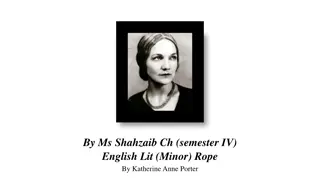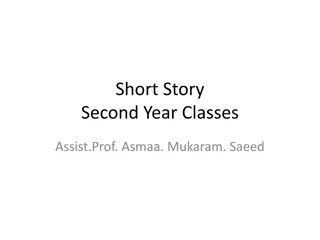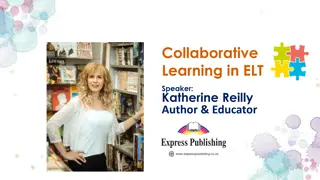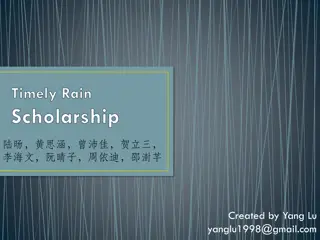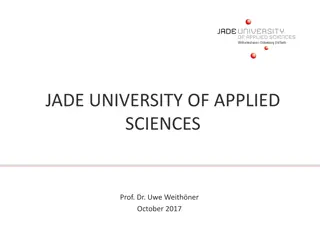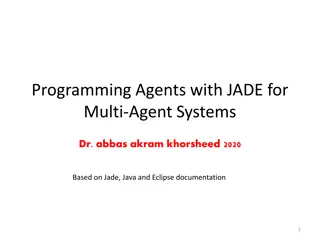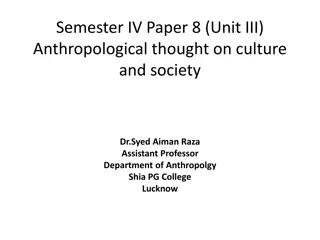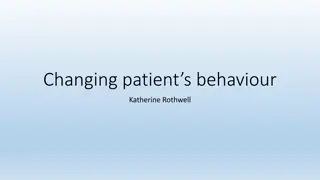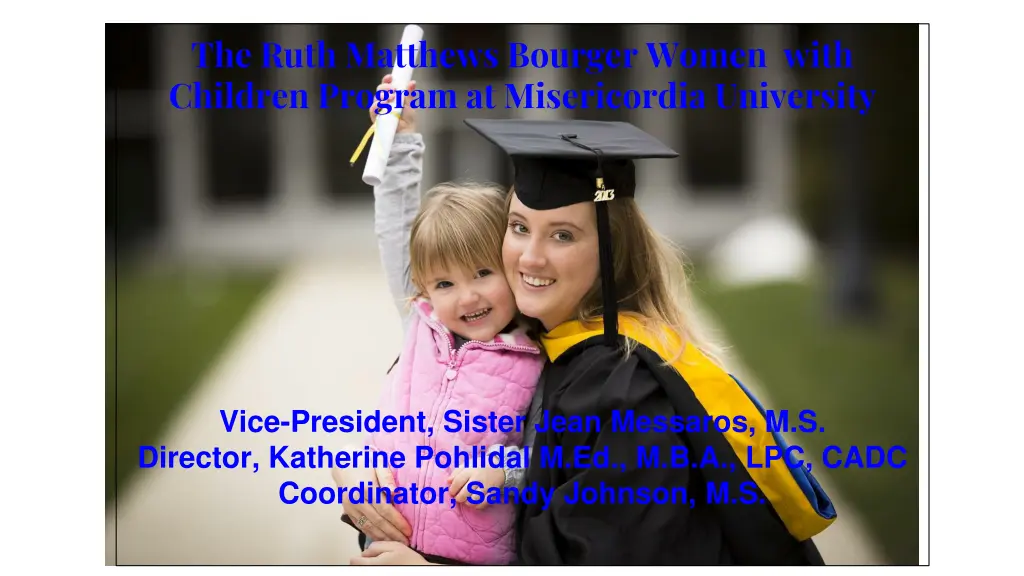
Empowering Single Mothers Through Education and Support Programs
"Discover the impactful Ruth Matthews Bourger Women with Children Program at Misericordia University, offering housing and education support to single mothers in need. Learn about the program's history, demographics in Luzerne County, and the two-generational model in higher education. Explore how this initiative helps student mothers break the cycle of poverty and achieve their academic dreams."
Download Presentation

Please find below an Image/Link to download the presentation.
The content on the website is provided AS IS for your information and personal use only. It may not be sold, licensed, or shared on other websites without obtaining consent from the author. If you encounter any issues during the download, it is possible that the publisher has removed the file from their server.
You are allowed to download the files provided on this website for personal or commercial use, subject to the condition that they are used lawfully. All files are the property of their respective owners.
The content on the website is provided AS IS for your information and personal use only. It may not be sold, licensed, or shared on other websites without obtaining consent from the author.
E N D
Presentation Transcript
The Ruth Matthews Bourger Women with Children Program at Misericordia University Vice-President, Sister Jean Messaros, M.S. Director, Katherine Pohlidal M.Ed., M.B.A., LPC, CADC Coordinator, Sandy Johnson, M.S.
PROGRAM HISTORY -Founded by Sister Jean Messaros in 2000 in response to the growing trend of single mothers applying to the university but were unable to afford to attend due to the cost of housing -The goal, eliminate the burden of rent in order to make education and a degree attainable -Student mothers could reside with their child on campus for up to four years for degree completion -The program s intention was to help single mothers and their children out of poverty through the attainment of a college degree -Since 2000, the program has now expanded to serve 16 families in three homes on our lower campus
DEMOGRAPHICS FOR LUZERNE COUNTY According to the U.S. Census, as of 2018: -Poverty rate for the county is 14.8%, the largest demographic in poverty are white women 25-35 years of age -41% of all households in the county are single parent families, 77% are single mother households representing largest segment of households living in poverty -Since 2000, there is a 14% point increase in single parent families from 10,203 to 14,230 in 2018 -11,535 children under the age of 18 live in poverty (United Way, Luzerne County)
Two Generational Model in Higher Education -A comprehensive, holistic response to both mother and child including: -Higher Education Setting and a Home Environment -Social Determinants of Health as drivers to programming initiatives and program design -Bio psychosocial model framework shapes a needs assessment and plan for each family -Integrated case management system
WWC STUDENT PROFILE At poverty level or on brink of poverty and most have lived in poverty or working poor growing up Zero EFC no family contribution to attend college First generation college students Common scenarios include: homeless/homeless shelters, fleeing domestic violence, widowed, divorced, living in public housing, working poor (two jobs), raised in foster care, food insecure, and sole provider for the child or children with no financial support Common goal is to provide a better life for their children through education and professional careers Don t want subsidies but need them (SNAP, WIC, TANF, ELRC) to make ends meet-hand up Are required to be full-time students (12 credits or more), make pace in the academic year to keep funding, maintain good academic standing with the university and with the program
WWC STUDENT PROFILE Students are required to work a minimum of 20 hours every two weeks in addition to being full-time students and full-time single parents They are required to adhere to the WWC Community Living Contract per semester, maintain housekeeping charges, 10 community service hours per year, maintain all subsidy requirements including all documentation and audits Must have primary physical custody of their children with documentation Must complete a criminal background check and a Pennsylvania Child Abuse Clearance Must have a car and driver s license (the program will assist with both if needed) WWC STUDENTS ARE RESPONSIBLE FOR MU TUITION-Scholarships are awarded to help
Areas of Focus-Home Environments-Free Housing for up to 4 Years-Year Round Community Living Environment, Sustainable Life Skills, Civility Code, Housing Contract, 24/7 support within home settings by WWC staff Case Management Needs supported CCIS, SNAP, WIC, Local Providers, Child care services Federal Work Study Priority placement for the 10 hour work week requirement Food Pantries on Site as well as food distribution, Nutritionist/Registered Dietician-food insecurity issues and stigma addressed On-site counseling, self-care, groups, parenting workshops and resources Consignment room, supplies, furniture and house needs supported in-house Card Access only, entry-way cameras, safety monitored 24/7
Emergency Funds for immediate needs-medications, clothing, blankets, toiletries House and Program meetings, individual meetings, updates, and Facebook group Wi-Fi Connected, Computer loan program, on-site study, printers and work areas for moms AKC Certified Pet Therapy Dog- for emotional support of families Children s Libraries in each home, play areas and backyard playgrounds On-site washers/dryers for all families
Student Mothers Programming On-campus counseling, tutoring, student success and accommodations, evaluations for learning disorders, and assistance with funding for medical and dental needs not covered by insurance -Off-campus counseling, service providers, one-on-one dietary consults and evaluations -Books are free and covered by the program for up to four years -Travel-Study Abroad opportunities for eligible students -One on one counseling, 24/7 support from WWC staff, and referral services -Funding for specific academic pursuits, Master class, conferences, and trainings -Career readiness including business attire, internship and job placement assistance
Student Mothers Programming -Mentoring and support from Advisory Board and community partners - Post-graduation transition planning, housing, and exit plan Mulier Fortis Graduation Ceremony, Misericordia ring, graduation cord, and WWC Alumni network -On campus meal plan for lunches -Car insurance stipend and built-in insurance class 101-life skill -Budgeting and Business basics-101 stipend for work readiness/interviewing and internships -Pell Bridge program to ensure funding for graduation completion for WWC students
Childrens Programming -Coordination and access to daycare, learning center, Head Start and Dallas Area School District -Swimming is a requirement and lessons are funded by the WWC program -Evaluation of child s needs, development and intervention services -One extra-curricular a year, funded for each child based on interest by WWC program -Kids on Campus Program, Arts and Interaction -Free access to MU s Speech Language Pathology, Occupational Therapy, Autism program -Shared Reading Program and early Literacy -Children eat for free on campus during the school year -Children s Garden and Education every summer -Summer camps, day camps, and scholarships for summer programming -Children s Libraries and Reading Events -Play grounds, free-play, and open green spaces for children at all three locations -Family Enrichment Programming: Holidays, Sporting Events, Day trips, Shows/Theater
Support for the Family System (16 Families) -Triple A coverage for cars ( basic package all 16 students) -Emergency Car Repair stipend ($500 for 2 year transfer students, $1,000 for 4 year students) -Dental Coverage provided when insurance will not cover or falls short -Eye care, glasses, contact lenses and supplies when insurance does not cover or falls short -Mental Health treatment (evaluations, assessments, counseling, medications and specific interventions including evaluations for learning disorders not covered by insurance) -Attorney Fees for court and custody changes (emergency only) -Fees covered for clearances both criminal background check and PA Child Abuse Clearance (for all candidates) - Emergency Food cards, gas cards, and medicines/supplies for example nebulizers and allergy medicines, winters boots/coats
Support for the Family -Parenting support, baby-sitting and family counseling as needed -Child Care (ELRC) priority placement for WWC students/ WWC covers until picked up -Support of food pantry and consulting nutritionist (CEO/ Food Bank) -Misericordia University waives the admission free for WWC Candidates
Career Readiness-Work Force Development -Internship support through transportation with gas cards -Conference attendance fees, professional organization fees and transportation expenses -Professional clothing and supplies for job interviews and job placements -Career-ready supplies including books, portfolios, and resume writing kits -Study abroad, mission trips and master classes -Moving expenses including rental trucks and transport fees -Fees for graduate school applications, testing and testing preparation classes/books -Graduation fees, cap and gown
University Support -CAPS Center-Counseling, support and referral -Career Services-internships and career placement -Access to all on-campus amenities and on-campus activities (gym, pool, cultural events) -Student Success Center-on-campus tutoring and academic support -Campus Safety-Emergency Response -Family friendly campus environment -Mission driven culture
Post Grad Planning WWC students complete one year of post-graduation planning during their final two semesters at Misericordia University. During this time, students will concentrate on the following core areas in preparation for graduation: -Career planning including interviews, internships, professional development programming and work-place readiness training -Mentoring through the WWC Advisory Board (all students are matched every year) assist with paid internships, career shadowing, academic support -Graduate school planning (if applicable) including housing, applications, and moving/transition support
Post Grad Planning -Housing including creating a budget and savings plan to secure affordable housing and financial literacy -Counseling to help with the post-graduation transition and support of the children as they prepare to move -Household budget planning and supplies including furniture/immediate needs -School information and transition plan for each child prior to moving from the WWC -WWC Mulier Fortis Graduation Ceremony occurs annually for each graduate/MU ring/cord -Membership to the WWC Misericordia University Mulier Fortis Alumni Group -WWC families remain with us until this plan is in place
Program Outcomes WWC Outcomes-Demonstrated Success -30 Graduates -100% professional placement post-graduation for all WWC graduates -90% student retention rate for the WWC program -80% of this cohort have achieved a masters degree or more (NYU, Johns Hopkins, Misericordia University, Marywood University, New York Law to name a few) -WWC graduates no longer access subsidies within two years of graduation -WWC graduates are now referents, donors, and public speakers for the program and give back to their communities through service -WWC graduates report that children are continuing to thrive, excel in school and the earliest graduates of the program now have children in colleges and universities themselves






